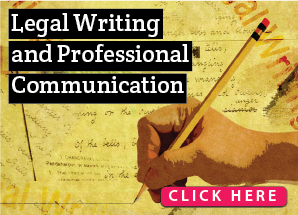 We now know the borders of the plain English debate—we know what legalese is and what writing using plain language involves. A common objection that arises at this point is along the lines of:
We now know the borders of the plain English debate—we know what legalese is and what writing using plain language involves. A common objection that arises at this point is along the lines of:
“Hang on a minute – all this plain language might be well and good, but should we really write in plain English when the law itself is not in plain English?”
This objection involves at least two aspects — firstly, that it’s hard to write in plain English when so much of the law is not expressed in that style. Secondly, that there’s something not quite right about a lawyer discarding legalese and writing in plain English. Let me tackle both of these issues.
To express my response to these objections, I will frame the job of a lawyer, especially when it comes to interacting directly with our clients, as having two principal parts.
Guide and interpreter
The way I see it, the law is a foreign land for most people and a lawyer must, therefore, act as both guide and interpreter. We have to ensure that we not only take our clients through this foreign land, but that they are also able to understand what is happening to them and their lives. So, not only do we have to be able to interpret the “foreign” language that a lot of the law is expressed in – that is, legalese – and when our clients are equipped with that translation, we also have to be able to guide them through the land and help them to make good decisions.
If we lawyers think of ourselves as interpreters, then any concerns about writing in plain English should easily be discarded. If you cannot explain a complicated concept of law relatively simply for the benefit of your client, then perhaps you do not understand that law well enough yourself. Understanding the law is not always easy, but as Einstein said, “If you can’t explain it simply, you don’t understand it well enough.”
I’ve already discussed in my previous posts how it is far more helpful to our clients if we write in plain English. Even the people we are trying to help may, at least initially, rebel against this approach. This is where the second objection often arises.
If, for example, you were to hand a contract drafted in plain English to a client and receive a negative response, you would not be the first lawyer to have had that experience. As with the wider profession, we also have to educate our clients and convince them of the benefits of plain English expression.
It is not uncommon for clients to have preconceived notions about lawyers and how they should communicate. That stereotype can easily translate into believing that lawyers only do their job properly if they use words that are big enough, if the documents they produce sound “lawyerly” enough (even if clients don’t understand them), or if the other side is being beaten into submission by a display of pompous, English-accented, verbosity.
We all know that those things are not the real skills of a fine lawyer or advocate, and we need to show our clients that too.
Show them real advocacy skills
You may well wonder how else you can prove your worth as a lawyer without fulfilling the expectations of the client. But a skilled lawyer does not need to hide behind useless words and flowery prose. Rather, a skilled lawyer takes their client along for the ride. A skilled lawyer’s clients are comfortable with the process and understands what is happening in their case. They have confidence in their lawyer not because of how fancy or educated their lawyer sounds, but because their lawyer has explained their case and the law to them clearly, and they have been able to ask questions and understand the answers. Their lawyer has given

them sound advice and has helped them make a decision that puts them in the best position possible, in the circumstances, to get a good result. Plain English helps us prove our worth to our clients in these ways, even when the way the law itself is expressed remains obscure and out-dated.
There are also wider professional benefits that go beyond our relationships with our clients. I’ll be discussing those in my next post. In the meantime, I hope you all consider using plain English to make your clients a part of the journey and don’t simply expect them to sit down on the bus, put a blindfold on, and not say a word.
(Tennille Duffy is part of the faculty at myLaw.net.)
